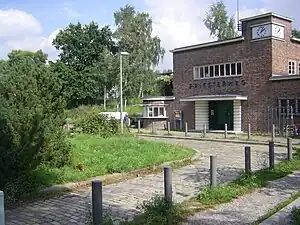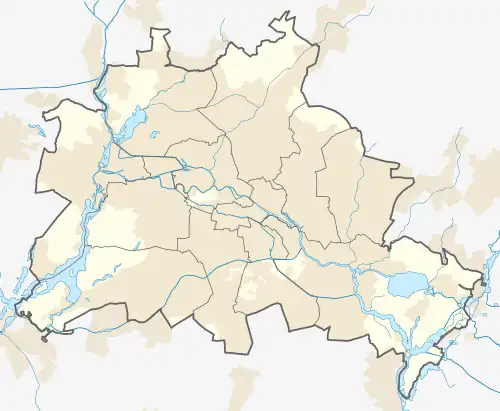Berlin Priesterweg | ||||||||||||||||||||
|---|---|---|---|---|---|---|---|---|---|---|---|---|---|---|---|---|---|---|---|---|
| Junction station | ||||||||||||||||||||
 Station building | ||||||||||||||||||||
| General information | ||||||||||||||||||||
| Location | Priesterweg, Schöneberg, Tempelhof-Schöneberg, Berlin Germany | |||||||||||||||||||
| Coordinates | 52°27′36″N 13°21′23″E / 52.4601°N 13.3563°E | |||||||||||||||||||
| Owned by | DB Netz | |||||||||||||||||||
| Operated by | DB Station&Service | |||||||||||||||||||
| Line(s) | ||||||||||||||||||||
| Platforms | 2 island platforms | |||||||||||||||||||
| Tracks | 4 | |||||||||||||||||||
| Construction | ||||||||||||||||||||
| Architect | Günther Lüttich[1] | |||||||||||||||||||
| Architectural style | Expressionism | |||||||||||||||||||
| Other information | ||||||||||||||||||||
| Station code | 5036[2] | |||||||||||||||||||
| DS100 code | BPRS[3] | |||||||||||||||||||
| IBNR | 8089034 | |||||||||||||||||||
| Category | 4[2] | |||||||||||||||||||
| Fare zone | VBB: Berlin B/5656[4] | |||||||||||||||||||
| Website | www.bahnhof.de | |||||||||||||||||||
| History | ||||||||||||||||||||
| Opened | 7 October 1928 | |||||||||||||||||||
| Services | ||||||||||||||||||||
| ||||||||||||||||||||
| Location | ||||||||||||||||||||
 Berlin Priesterweg Location within Berlin | ||||||||||||||||||||
Priesterweg station is on the Anhalt Suburban Line in the district of Schöneberg in the Berlin borough of Tempelhof-Schöneberg. It is served by Berlin S-Bahn lines S2, S25, and S26.
Location
The station is located in the district of Schöneberg in Tempelhof-Schöneberg. The Berlin city center lies 8 km to the northeast. It fronts onto the streets of Priesterweg and Prellerweg to the west. Located east of the station on former rail yards is the Natur-Park Schöneberger Südgelände (South Grounds Nature Park). Southwest is the Insulaner (literally “islanders”, which was derived from the name of a cabaret program broadcast on Rundfunk im amerikanischen Sektor during the Berlin Blockade), a hill formed of rubble created by Second World War bombing raids, which the Wilhelm Foerster Observatory is located on. Südkreuz station is located about 1.8 kilometres to the north, Attilastraße station is about 1.3 km to the south and Südende station is about 1.4 km to the south. The station is located in the Berlin B fare zone of the Verkehrsverbund Berlin-Brandenburg.
History
The station was opened on 7 October 1928. There were initially two island platforms. Electrification on the current S-Bahn system commenced on 2 July 1929. Before that time, there were electrical test operations using a 550 V DC system. Since 15 May 1939, the station has been served exclusively by electric powered S-Bahn trains. A second entrance was built and the entire station was modernised. Rail services were abandoned towards the end of the Second World War in April 1945.
The station was reopened for steam-powered trains on 8 June 1945. Electrical operations were resumed on 16 August 1945.
Following the takeover of the S-Bahn by the Berliner Verkehrsbetriebe (BVG, Berlin Transportation Company) on 9 January 1984, the route to Lichterfelde Süd was shut down. Trains ran only on the outer tracks. In May 1990, platform A was taken out of service and trains stopped at platform B only. Platform A was demolished and rebuilt a little further south; it was put back into service on 29 June 1992. After that, platform B was similarly rebuilt. The old entrance and the station building have been preserved, but they now lie at the northern end of the platform. A new southern entrance to platform A was opened on 3 August 1993. The newly built platform B eventually went into operation on 6 December 1993. Since then, the station has been partly covered. A new southern entrance for platform B was completed in January 1995.


Connections
The station is served by Berlin S-Bahn lines S2, S25, and S26. There are interchanges with the following bus routes operated by the Berliner Verkehrsbetriebe.
| Line | Route |
|---|---|
| M76 | Lichtenrade – Walther Schreiber Platz |
| X76 | Lichtenrade, Nahariyastraße – Walther Schreiber Platz |
| 170 | Baumschulenstraße/Fähre – Rathaus Steglitz |
| 246 | Hermannstraße – Friedrich-Wilhelm-Platz |
See also
Notes
- ↑ "Architektur und Baugeschichte des S-Bahnhofs Priesterweg" (in German). www.baufachinformation.de. Archived from the original on 24 July 2012. Retrieved 16 May 2015.
- 1 2 "Stationspreisliste 2024" [Station price list 2024] (PDF) (in German). DB Station&Service. 24 April 2023. Retrieved 29 November 2023.
- ↑ Eisenbahnatlas Deutschland (German railway atlas) (2009/2010 ed.). Schweers + Wall. 2009. ISBN 978-3-89494-139-0.
- ↑ "Der VBB-Tarif: Aufteilung des Verbundgebietes in Tarifwaben und Tarifbereiche" (PDF). Verkehrsbetrieb Potsdam. Verkehrsverbund Berlin-Brandenburg. 1 January 2017. Retrieved 25 November 2019.
References
- Jürgen Meyer-Kronthaler, Wolfgang Kramer (1998). Berlins S-Bahnhöfe. Ein dreiviertel Jahrhundert (in German). Berlin: Be.bra. pp. 235–236. ISBN 3-930863-25-1.
External links
- "Heritage listing of Berlin Priesterweg station" (in German). Government of Berlin. Retrieved 16 May 2015.
- "Berlin Priesterweg" (in German). stadtschnellbahn-berlin.de. Retrieved 16 May 2015.